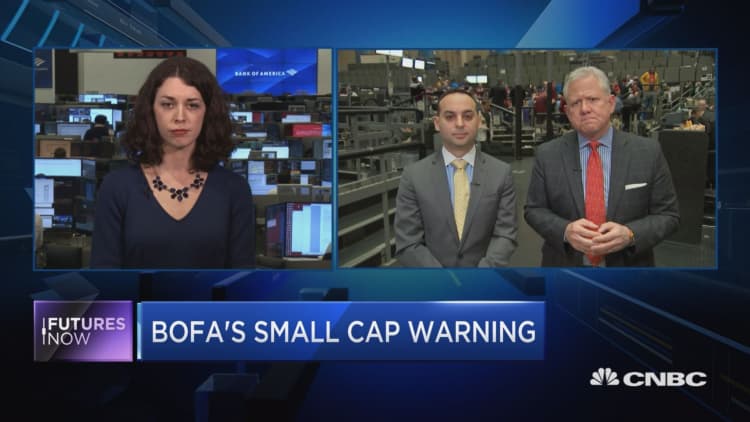
As investors try to cope with the ongoing U.S.-China trade war, BofA-Merrill Lynch is telling investors to resist the temptation to invest in small cap stocks.
Jill Carey Hall, the firm's small cap expert, warns the widely held perception they're insulated from the effects is ill-conceived — adding fundamentals in the space remain challenged.
"A lot of these companies are suppliers to the big multinationals. Many of them have been highlighting the impact of trade on calls this earnings season," the senior U.S. equity strategist told CNBC's "Futures Now" on Thursday. "A lot of these companies might not be able to be as nimble about shifting their supply chains or pricing that through."
The Russell 2000, which is comprised of small caps, is up 21% since the December pullback. But it remains in correction territory — off almost 12% since its all-time high hit last August.
And, Hall suggests there's no material rebound in sight.
"Small cap earnings have been coming in in-line with expectations. You've seen much fewer beats. You've seen negative earnings growth," said Hall. "Typically, you would think of small caps as higher growth companies, but expectations have been really ratcheted down."
Plus, she's spotting an ominous characteristic in the group that's historically linked to economic downturns.
"Twenty-five percent of the small cap benchmark doesn't have earnings or non-earnings," Hall added. "You typically don't see that unless you are right outside or leading into a recession."
"Some of the more defensive areas have been screening better"
Despite her cautious outlook, she isn't throwing all small caps out with the bathwater. According to Hall, there are a couple of exceptions.
"Some of the more defensive areas have been screening better within small caps like utilities," she noted. "One of the sectors that recently has shown the biggest improvement in how it looks within our work is energy."
With WTI crude oil prices rising 38% so far this year, Hall said the price increase is appearing in stocks tied to energy.
"That was a sector that had ranked at the bottom of the pack for a few months," Hall said. "We're starting to see signs that investors are finally putting some money back into energy. Flow trends are picking up. Analyst upgrades have started to increase for more of the oil sensitive names."



